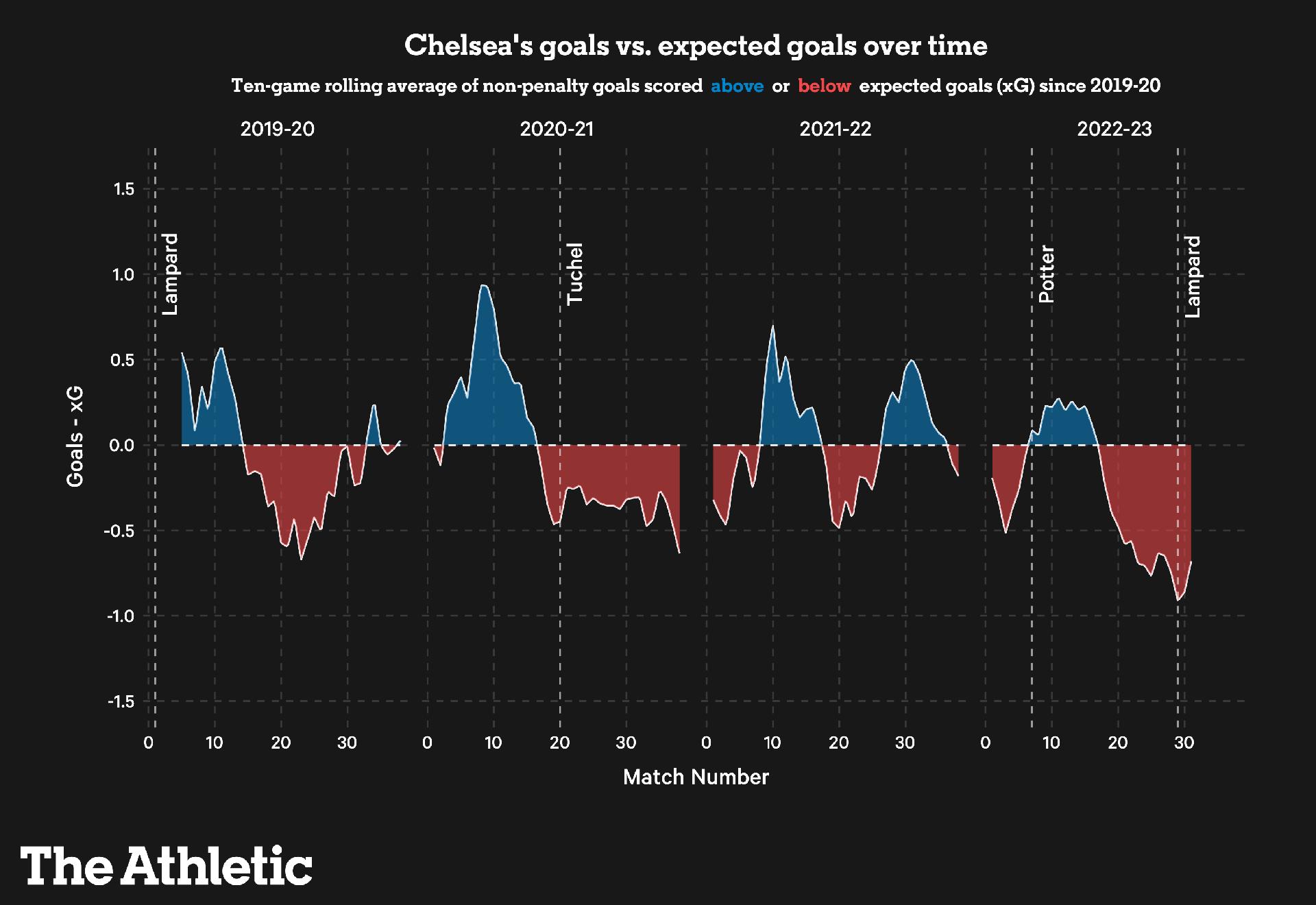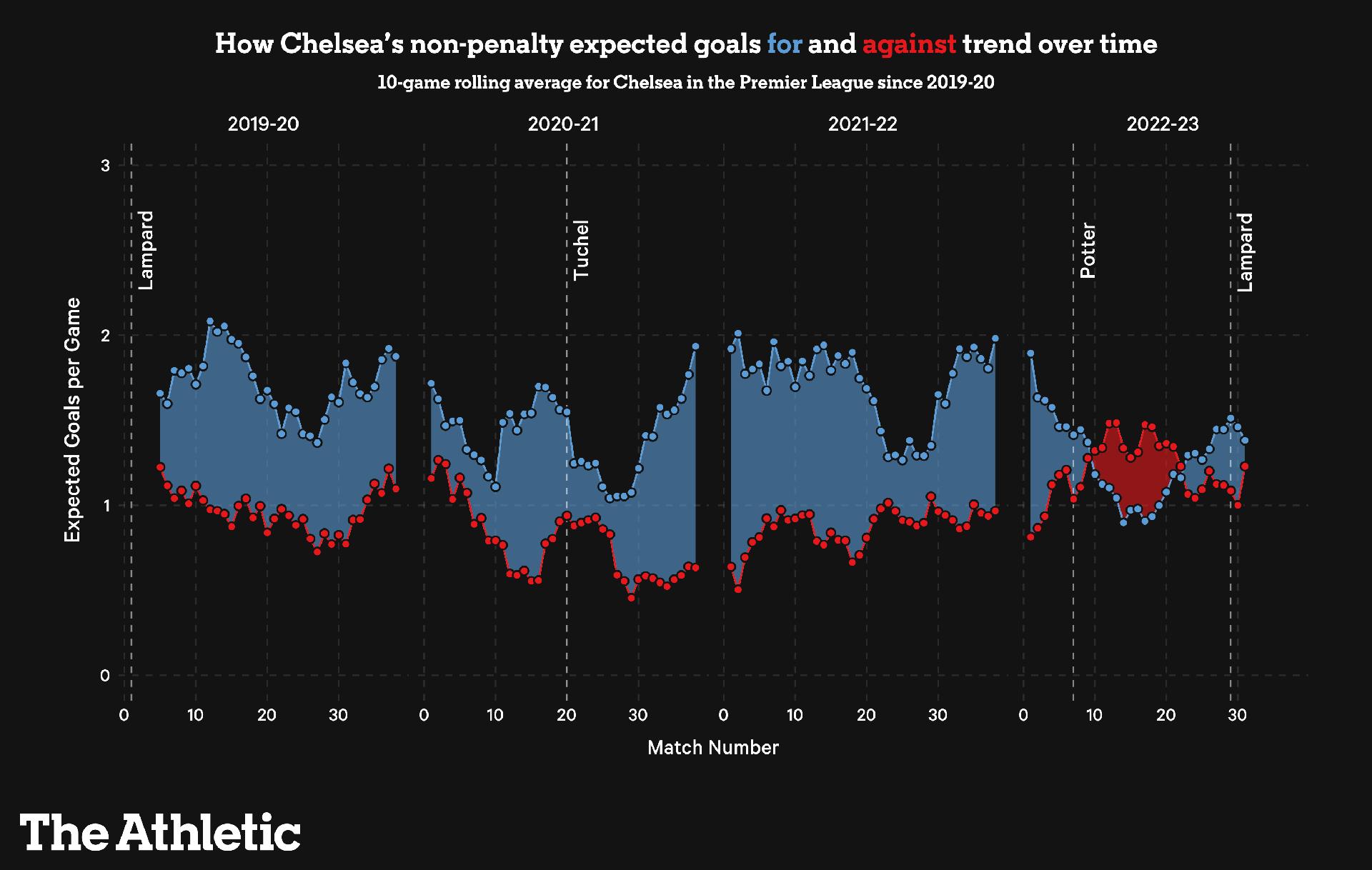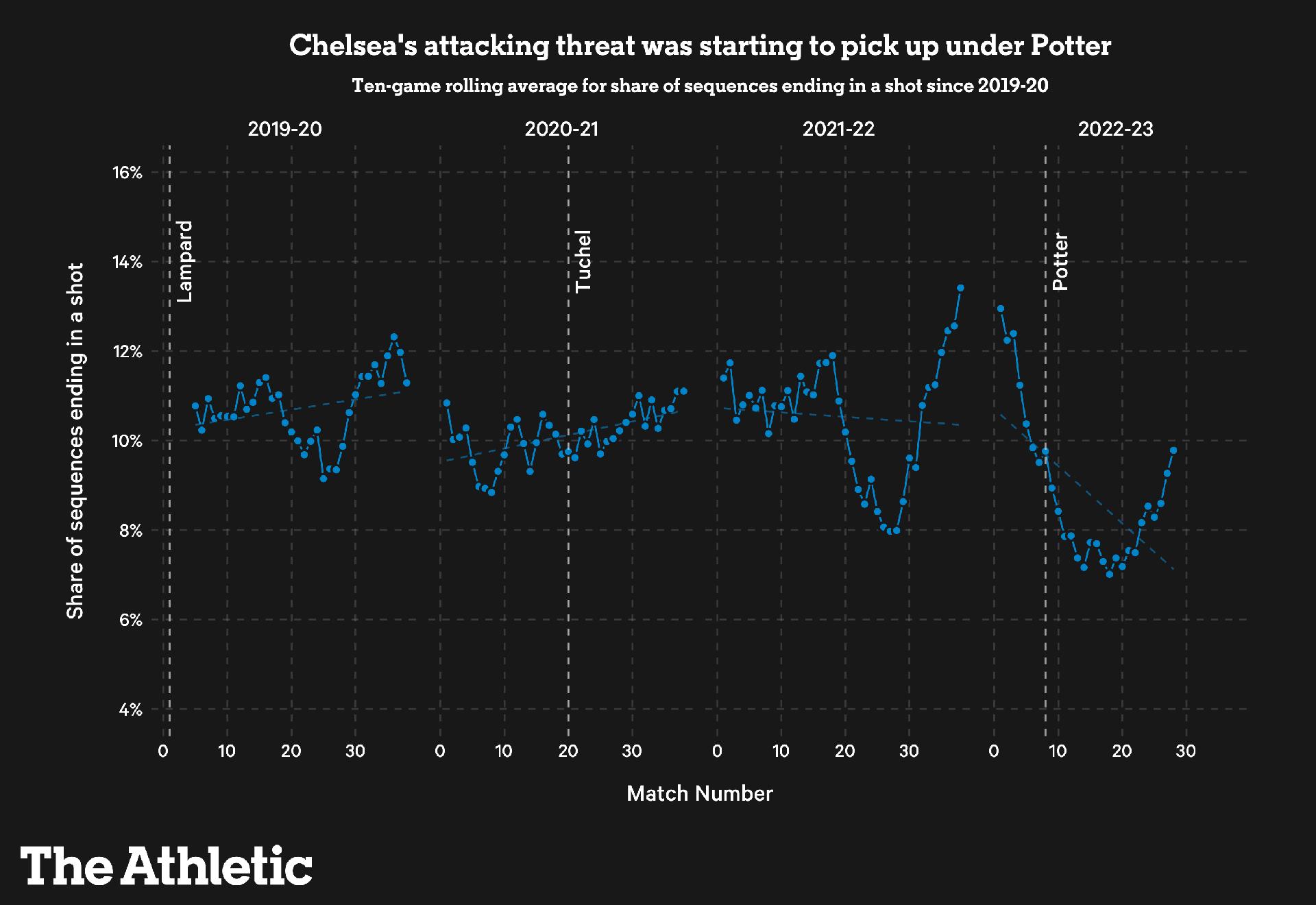Why can’t Chelsea score goals?
Stamfordblue 2023-04-24 22:10:26 评论
Watching only Chelsea matches this season would leave you with a very warped perception of how difficult it is to score a goal in professional football.

Missed sitters, offside runs, blocked shots, bad passes, communication breakdowns, wrong decisions, runners not seen… this very expensively-assembled group of players have a seemingly endless variety of ways to ensure the ball does not find the opponents' net. And it's getting worse: Chelsea's aversion to scoring has steadily increased as the season has gone on under Thomas Tuchel, his replacement Graham Potter and now Frank Lampard.
Their last five matches across all competitions have yielded one goal: a heavily-deflected Conor Gallagher shot in a 2-1 home defeat against Brighton & Hove Albion earlier this month. At their current scoring rate, Chelsea will end the 2022-23 Premier League season with 37 goals from their 38 matches — by some distance their worst attacking return for a campaign in the 31-year history of the competition.
It hardly helps that, according to Fbref.com, Chelsea have underperformed their non-penalty expected goals (npxG) in the league this season by a whopping 10.2 goals; put simply, they have scored 10.2 goals fewer than the quality of opportunities created indicates they should have. West Ham United and Everton are the only two teams in the 20-strong division who have performed worse in front of goal relative to expectations.
This statistical underperformance is a combination of poor finishing, above-average goalkeeping and good old bad luck.
Such variables mean there is always some degree of ebb and flow to a team's scoring return relative to xG (expected goals), and the graphic below does appear to indicate Chelsea are on an unsustainably dismal run in front of goal.
But this particularly toothless version of Chelsea need more than a little regression to the mean to solve their chronic attacking problems.
Their non-penalty xG of 37.2 ranks 12th in the Premier League, and their projected non-penalty xG for the season of 45.6 fits the profile of a mid-table team (which, of course, they currently are as they sit in 11th place) rather than a club with aspirations to contend for domestic and European trophies.
Fixing the most confoundingly bad attack in world football will be a key priority for Chelsea's next head coach — and it will be easier said than done.
The interesting thing about Chelsea's success during the Roman Abramovich era is that, despite his frequently cited desire to watch free-flowing, expressive football, very few of the 19 trophies won in his 20 years owning the club were secured via irresistible attacking firepower.
Only twice in the Premier League era have Chelsea been the division's highest scorers in a single season: in 2005-06, a relatively modest tally of 72 goals was enough for Jose Mourinho's title winners to share the honour with runners-up Manchester United and in 2009-10, when Carlo Ancelotti's side racked up a then-record 103 goals to become champions again.
Most of Chelsea's greatest triumphs have been built on dominating at the other end of the pitch. Mourinho's imperious 2004-05 side conceding just 15 goals in 38 league games is one of the few Premier League team records Pep Guardiola's Manchester City are yet to break, and the Champions League triumphs of 2012 and 2021 were both founded on defensive diligence.
Within this context it was a particularly ominous sign for Potter when, after a bright start to his tenure, Chelsea endured a prolonged stretch in which their non-penalty xG conceded rose significantly above their own non-penalty xG per game. This statistical change — during which Chelsea were expected to concede more goals than they would score — was reflected in the torrid run of results from early November to the end of February that ultimately doomed Potter:

Nothing on a football pitch happens in isolation, though, and a slip in defensive standards can also take a toll on a team's attack. More minutes played while level or behind in matches means more time spent trying to break down deep, compact opposition defensive blocks rather than making the most of spaces that can open up in transition when you're ahead.
Up to the point Potter was sacked on April 3, Chelsea had spent just 24 per cent of their total Premier League minutes in a winning position. They had also taken more shots than any other team in the division while level or behind since his appointment in September. Neither of those trends has improved under Lampard. More heavily-defended shot attempts, taken under greater pressure from the scoreline, are not ideal conditions for a healthy attack.
There is also a more obvious factor: Chelsea are simply not shooting enough. They are averaging 12.4 attempts per 90 minutes in the Premier League this season, down from 15.3 in the previous one. Eight teams in the division shoot more frequently than they do, including Brighton and the rest of the traditional 'Big Six'.
The graphic below illustrates how Chelsea's shot attempts per 90 minutes have nosedived in 2022-23 — but also suggests the decline began in Tuchel's tenure.
Tuchel found Chelsea's underwhelming final-third production a source of endless frustration, and in the course of expressing that frustration he clashed with many of the individual attackers in his squad — most memorably losing trust in and eventually freezing out Tammy Abraham, Romelu Lukaku and Timo Werner.
Chelsea did at least begin to improve their share of sequences ending in a shot attempt towards the end of last season, before nosediving in this particular metric during Tuchel's final games in charge early in this one.
The team then became steadily more passive and less threatening in possession for much of Potter's tenure, before making some positive progress — though it came too late to restore faith from supporters and ownership in his ability to oversee a longer-term rebuild.

Neither manager was able to instil greater ruthlessness in an attack that has lagged behind many of Chelsea's domestic rivals for several years.
One good statistical way to measure the attacking prowess of teams and individuals is to subtract their non-penalty xG from their non-penalty goals: in other words, did they score more or fewer goals from open play than expected, given the quality of chances created?
This particular metric does not eliminate the impact of goalkeeping brilliance or mistakes, or of more good or bad luck, but tracking this number over multiple seasons does provide a reasonably reliable guide to the teams and players who consistently exceed expectations with their goal returns.
Generally speaking — and there can be significant fluctuations from season to season — the best teams and individuals tend to outperform their non-penalty xG totals over a longer period.
The first graphic below illustrates that Chelsea are on course to underperform relative to their non-penalty xG for the third time in the last six Premier League seasons. The second one (accessible by clicking the next slide button) shows they are the only members of the traditional 'Big Six' who have, on average, scored fewer goals from open play than expected over the past six seasons.
Not coincidentally, Chelsea have had none of the Premier League's most reliable goalscorers for much of this span; a reality that perhaps goes some way towards explaining the moves to bring Raheem Sterling and Pierre-Emerick Aubameyang to Stamford Bridge last summer.
The first slide in the graphic below illustrates how those two and the division's other best scorers have all outperformed their non-penalty xG to varying degrees on average since 2017-18 — and the second contrasts their efforts with Erling Haaland's historically ludicrous 2022-23 campaign with Manchester City.
Chelsea, clearly, do not have anyone remotely in his class in the final third among their bloated squad. The last No 9 at Stamford Bridge to score 20 Premier League goals in a season was Diego Costa in 2016-17, and nobody has scored 15 non-penalty goals in the top flight since Abraham three years ago.
But the problem is bigger than that.
Beyond newcomers Aubameyang and Sterling, only Mason Mount has reliably outperformed his non-penalty xG in the last four years. Werner and Kai Havertz in particular have significantly underperformed, while the graphic slideshow below also underlines how much the club have missed the prime version of Eden Hazard.
Chelsea are in the market for attacking reinforcements this summer and have already finalised a deal to sign France forward Christopher Nkunku from RB Leipzig. It is tempting to conclude that they have simply recruited poorly in attacking positions in recent years, and that might well be true in some cases — but it also ignores the reality that many of the attackers who have joined the club have then seen their production decline in key areas.
Some of this is to be expected when moving to the Premier League from other competitions, and also when leaving clubs where they were undisputed No 1 attacking options for an environment where they are expected to be part of a collective of stars. But these issues do not appear to have troubled players moving to City or Liverpool — two clubs with established, highly productive attacking systems — to anywhere near the same degree.
Is it a case of Chelsea signing bad players, or of Stamford Bridge increasingly being the place where attackers go to lose their rhythm and confidence in systems that do not maximise them? It is worth noting that Havertz significantly outperformed his non-penalty xG in each of his final two seasons at previous club Bayer Leverkusen, as Werner did in his 2019-20 farewell campaign with RB Leipzig.
None of what we have seen from Chelsea's attack this season can be separated from the chaos of the last 18 months at the club, and the sweeping changes driven by new owners Todd Boehly and Clearlake Capital that have disoriented everyone on and off the pitch.
It is far too early, for example, to even begin to judge January signings Mykhailo Mudryk or Noni Madueke, given their relative lack of minutes and adaptation time, even as their presence in the squad has contributed to Chelsea's lack of fluidity. Sterling has disappointed, but he enjoyed his best seasons at City as a smart runner in a clearly defined tactical role in a functional system — not as the kind of rising tide that can lift all other boats.
Next season will bring new challenges, and not simply with the arrival of Nkunku.
Mount's future is uncertain, while Christian Pulisic and Hakim Ziyech are likely to leave and loanee Joao Felix will be very expensive to retain. Romelu Lukaku is almost certainly too expensive to sell when his loan at Inter Milan ends, but is he still good enough for his parent club to use? How much money will be made available to add to Chelsea's eclectic attacking mix?
The good news for Potter's full-time successor is that the bar for improving this team's attack could hardly be lower; even overseeing a change from 'historically bad' to 'underwhelming' will qualify as a short-term success.
In the longer term, however, whoever takes the job will need to find more substantial solutions in the final third if serious contention in the Premier League and Champions League are to become realistic targets again.
- 消息参考来源: SN_SPIDER_MANUAL
- 严禁商业机构或公司转载,违者必究;球迷转载请注明来源“懂球帝”
- 懂球帝社区规范:抵制辱骂

